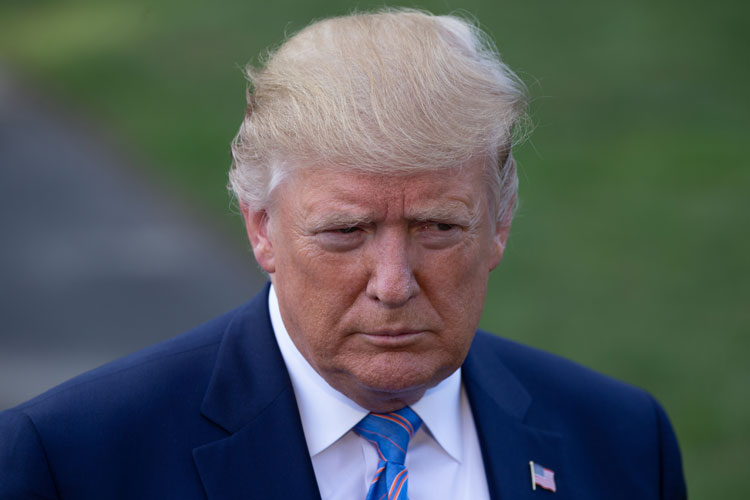If DOJ prosecutes Trump, what charges could it bring? Experts consider possibilities

Former President Donald Trump in August 2019. Photo from Shutterstock.
Updated: Information revealed in the congressional hearing into the Jan. 6, 2021, U.S. Capitol riot could serve as the basis for a criminal investigation by the U.S. Department of Justice of former President Donald Trump, some experts say.
So far, there is no public indication that an investigation is taking place, according to Neal K. Katyal, a partner at Hogan Lovells and a former U.S. acting solicitor general, who wrote an op-ed in the New York Times. No witness has revealed being called before a grand jury, and nothing has been filed seeking to block the investigation.
But a federal judge raised the legal issue in a March ruling. U.S. District Judge David Carter of the Central District of California wrote that it is “more likely than not” that Trump and former Chapman University law professor John Eastman “dishonestly conspired” to obstruct the vote certification.
At the time, a Trump spokesperson said the judge’s claim was “absurd and baseless,” according to NBC News.
Barbara McQuade, a professor at the University of Michigan Law School and a former U.S. attorney who spoke with the New Yorker and NBC News, said she supports prosecution of Trump for trying to overthrow the election, despite the possible consequences. Prosecution “will very likely spark civil unrest and maybe even civil war,” she told NBC News.
If criminal charges are brought, what would they be? Katyal and McQuade consider the possibilities, along with Daniel Medwed, a professor at the Northeastern University School of Law, who spoke with GBH, and Ken Gross, former associate general counsel of the Federal Election Commission, who spoke with NPR.
The experts discussed these charges:
• Obstruction of an official proceeding—for trying to stop the certification of the vote Jan. 6, 2021. Prosecutors would have to show an orchestrated plot to try to interfere with certification, and that Trump was part of the plot. Some have asserted that Trump could defend against the charge by saying he genuinely thought that he won the 2020 presidential election and wasn’t acting “corruptly.” But the argument would be difficult after committee testimony showing a number of people informed that Trump he had lost the election, according to Katyal.
• Conspiracy to defraud the United States—for conspiring to defraud the American people and interfere with the transfer of power. The charge requires proof that two or more people agreed to obstruct or impede the official functioning of government. A genuine but mistaken belief isn’t enough to defeat a conspiracy charge, Katyal said.
• Seditious conspiracy—which requires proof that two or more people agreed to use force to delay the execution of a law or to overthrow the government. Trump could assert that he never formally agreed with someone else to use force during the Capitol riot, even though he wanted to delay certification of the vote. Katyal and McQuade said this charge would be difficult or unlikely.
Medwed said he thinks that the congressional committee is trying to establish a “wink-and-a-nod” understanding between Trump and the rioters by referring to Trump’s tweets and his 2020 debate comment to the Proud Boys to “stand back and stand by.”
But Medwed thinks that Trump will argue that he didn’t intend for the riot to happen or know that it would happen, a “plausible deniability” defense.
• Wire fraud—for misleading donors who thought that their money would support legal fees to overturn the election, when in reality, it went to the Save America political action committee and then was distributed to pro-Trump organizations. Such a prosecution would be difficult, Gross told NPR. Unless there is evidence that the money was converted for personal use, a case would be too tough to bring, he said.
“As distasteful as it is to raise money for a purpose other than what you’re going to use it for, in the political arena, there’s a good bit of latitude given to campaigns because oftentimes, money is used for some other purpose,” Gross told NPR.
DOJ lawyers, meanwhile, have renewed their request for copies of transcripts of all witness interviews conducted so far by the Jan. 6 committee, Politico reports.
The department said in a June 15 letter the interviews “are not just potentially relevant to our overall criminal investigations but are likely relevant to specific prosecutions that have already commenced. … As you are aware, grand jury investigations are not public, and thus, the select committee does not and will not know the identity of all the witnesses who have information relevant to the department’s ongoing criminal investigations.”
The letter was attached to a motion seeking a trial delay for two defendants charged in the Capitol riot.
See also:
ABAJournal.com: “Meet Greg Jacob, Pence lawyer who opposed ‘made up’ election theory, sent ‘furious message’ Jan. 6, 2021”
ABAJournal.com: “Lawyers surrounding Trump rejected stolen election claims; Barr calls claims ‘idiotic’ and ‘disturbing’”
ABAJournal.com: “Rudy Giuliani faces ethics charges in DC over failed election arguments”
ABAJournal.com: “Former Chapman law prof says ex-dean knew of his work for Trump; 2 students were ‘thrilled’ to help”
ABAJournal.com: “Chapman University says it didn’t authorize law prof’s representation of Trump, yet work was on server”
ABAJournal.com: “Prove it up: Scholars criticize law prof’s speech about secret folders and say it was unsupported”
Updated June 16 at 2:20 p.m. to include information on the U.S. Department of Justice’s June 15 letter.
Write a letter to the editor, share a story tip or update, or report an error.


